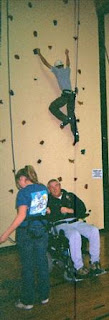Rich Fabend
The radical physical and mental changes I went through following my accident were overwhelming. My mental rehabilitation lagged behind, slowed by two major thoughts. I had retired seven months prior, at age 55, looking forward to spending the years ahead pursuing the recreational activities I enjoyed so much. One of my biggest concerns adjusting to my new life was the belief that I would not be able to return to the activities which provided me with quality of life. I also feared my most productive days were behind me and I would simply exist for the rest of my life. The change in my outlook began during a recreation field trip to the Denver Zoo. I was accompanied on this field trip by my daughter and two grandchildren. As I watched my grandchildren running around and listened to their questions and the talk of others around me, I began to realise I still had much to share.
The ongoing process of mental recovery was greatly influenced by my former association with the martial arts and Project Adventure. The martial arts stress the mind body connection, focusing one’s mental energy and looking at issues as challenges to be solved rather than problems with which to be dealt. Project Adventure (PA) “… is a challenging outdoor personal development and team building activity which usually consists of high and/or low elements. Low elements take place on the ground or only a few feet above the ground. High elements are usually constructed in trees or made of utility poles and require a belay (being a attached to a safety line) for safety.” (wikipedia.org/wiki/Ropes course). PA helped me understand what success and failure means, and I learnt about commitment and alternative ways of solving problems. The importance of the mind, the thought process and one’s attitude facing challenges became very clear to me. When trying to accomplish a task, I believe it is human nature to rely on a method which has been successful in the past. This often encourages us to use only limited means to accomplish a particular goal. If I asked 10 people, most anywhere in the United States, to catch a fish chances are almost all of them would grab a fishing pole since this method has been successful and therefore widely used in our culture. Initially when dealing with the challenges placed on people by a disability, I think they often try to solve problems using the same skills they used before their impairment. This approach can create extreme frustration and an acute awareness of the limitations placed on them by their condition. In reality, if we think about it, there are usually many ways to solve a particular problem. If I presented the same challenge of catching a fish to 10 people who were selected from different cultures around the world we would probably see a wide variety of approaches to accomplishing this task. Fish might be taken with a spear, bow and arrow, casting a net, using a gill net, with fish traps, use of hands (one hand method is called Noodling) or use of another animal like a cormorant. With this example it becomes apparent that there are a lot of different ways to accomplish a given task. So learn to think outside the box and experiment with different approaches.
My introduction to adaptive equipment began one day when I dropped a piece of paper on the floor. Because of my level of injury I was constantly dropping things and then having to call my wife or nurse to pick them up for me. I knew something had to change. How would my attitude toward picking up that piece of paper affect me? If I decided I could not pick up the paper, chances are it would foster a negative feeling of defeat which then could further my disability. It took me quite a while and involved a lot of failure and frustration to reach the point where I am today. If at first you don't succeed try, try again. How many times have we heard that? I have learnt over the last eleven years that if you have an open mind and an active brain you can always find different ways or methods to solve most of the challenges we face. It is just a matter of how much thought, time and perseverance you are willing to commit to the process.


Hi, having read your story you are indeed a remarkable man. My little man has cerebral palsy and has had so since birth so at the age of 55 years young, you have so much experience and knowledge, i am really glad that you are continuing to share with others.
ReplyDeleteCheers
Debby
debby@comcen.com.au